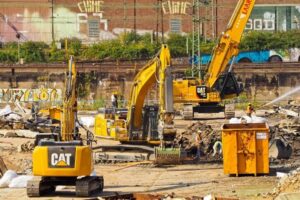If you’ve grown your small business to the point where you need to move to a physical premises, then you’ve got a lot of important decisions ahead of you. A good business premises should help you to operate effectively, without running you into any major financial issues. You don’t want to be legally tied to a building that won’t suit your needs in the future, after all! While different business owners will need to think about different things, there are certain universal steps that all CEOs need to take…

Image credit: Pexels
Specifying your Requirements
First off, you need to draw up a list of what you’ll need for your new premises. The size and layout of the premises you’ll need to operate effectively is always key, along with the structure and appearance, both internally and externally. Depending on the niche, there may be structural requirements for moving in equipment, like high ceilings or wide doorways. It’s also important to think about the utilities, such as power and drainage, considering how energy-efficient you want the building to be, as well as any specific energy requirements you’ll need to make the business tick. You’ll also need to consider any facilities needed for the comfort of both employees and visitors. This includes lighting, toilets, kitchen facilities and space for visitors’ lounges or conference rooms. Depending on your long-term business plans, you may want to have the flexibility to expand the premises, or certain areas of it as well. Listing all your requirements, while sticking within your budget, will get your search for a premises off to a great start.
Legal Considerations
As you can imagine, moving your business to a new premises comes with a host of important legal considerations that have to make it into your plans. First of all, you need to establish that the premises has planning permission that allows it to be used for your kind of business. The commonly overlooked regulations in this area might surprise you. One of the most important things you need to ensure is that the whole building complies with building, fire, and health and safety regulations. This could mean budgeting for some additions to the premises, such as exit signs,
passive fall protection, emergency lighting, and so on. If you’re going to be using the site for any customer-facing sales, even if it’s just one little factory shop, you’ll have to make any reasonable modifications that will make it accessible for disabled people. While considering all of these, you also need to make sure you can comply with the terms of any lease or license agreement you’ve got your eye on. There may also be restrictions regarding noise pollution, the times that deliveries are allowed, and the methods you use to dispose of your waste. Keeping in-line with the law in these areas can be a challenge, but there’s no point in rushing the process for a premises that’s not going to suit your needs, just to save a little money on legal compliance.
Choosing the Right Location
As if all of this wasn’t enough, you also have to invest a fair amount of time chewing over the right location for your business. This can have more of an impact to your commercial success than many business owners seem to realise. Some of the key factors to consider are the level of passing trade and foot traffic, especially if your business is customer-facing. The concentration of competitors in the area is another major thing to look at. While some businesses, for example realtors, can benefit from having similar offices in the immediate vicinity, most other niches will only be making things harder for themselves by setting up shop near their rivals. Transport links and parking facilities are also very important factors to consider, especially if the majority of your employees have been working remotely up until now. You don’t want workplace morale to suffer when people have to make a long and difficult commute, and you don’t want to chase away customers by not having any decent parking. Going back to our last point, you’ve got to think about any delivery restrictions that may cause a problem for your suppliers, and how you can make the premises more accessible to long-haul trucks. Local authority charges, for things such as waste collection, can vary greatly, and pile on more ongoing costs for keeping your business in a certain area. You’ll need to weigh this up against the benefits of any particular location you’ve got your eye on, and decide whether it’s worth the cost.





